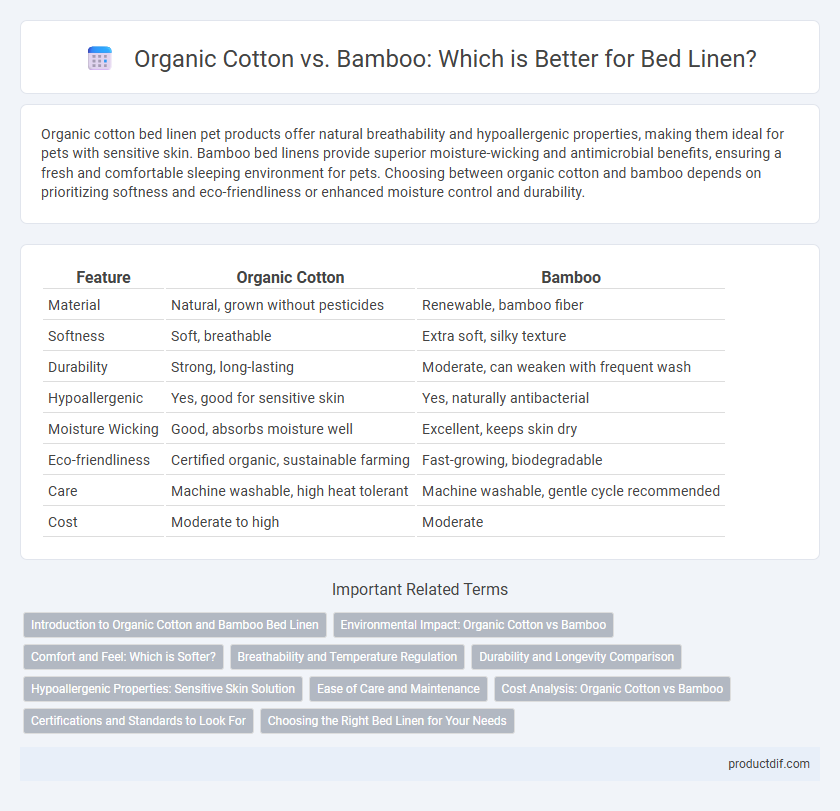Organic cotton bed linen pet products offer natural breathability and hypoallergenic properties, making them ideal for pets with sensitive skin. Bamboo bed linens provide superior moisture-wicking and antimicrobial benefits, ensuring a fresh and comfortable sleeping environment for pets. Choosing between organic cotton and bamboo depends on prioritizing softness and eco-friendliness or enhanced moisture control and durability.
Table of Comparison
| Feature | Organic Cotton | Bamboo |
|---|---|---|
| Material | Natural, grown without pesticides | Renewable, bamboo fiber |
| Softness | Soft, breathable | Extra soft, silky texture |
| Durability | Strong, long-lasting | Moderate, can weaken with frequent wash |
| Hypoallergenic | Yes, good for sensitive skin | Yes, naturally antibacterial |
| Moisture Wicking | Good, absorbs moisture well | Excellent, keeps skin dry |
| Eco-friendliness | Certified organic, sustainable farming | Fast-growing, biodegradable |
| Care | Machine washable, high heat tolerant | Machine washable, gentle cycle recommended |
| Cost | Moderate to high | Moderate |
Introduction to Organic Cotton and Bamboo Bed Linen
Organic cotton bed linen is cultivated without synthetic pesticides or fertilizers, ensuring a sustainable and eco-friendly textile option with natural breathability and softness. Bamboo bed linen, derived from bamboo pulp, offers exceptional moisture-wicking properties, antibacterial benefits, and a silky texture ideal for sensitive skin. Both materials provide durable, hypoallergenic bedding choices that promote comfort and environmental consciousness in modern households.
Environmental Impact: Organic Cotton vs Bamboo
Organic cotton bed linen typically requires more water and land resources but uses fewer pesticides and synthetic fertilizers compared to conventional cotton, reducing soil and water contamination. Bamboo bed linen, derived from fast-growing bamboo grass, has a lower water footprint and requires no pesticides, which minimizes environmental degradation; however, its chemical-intensive processing can impact water quality if not managed properly. Choosing certified organic cotton or bamboo products with eco-friendly manufacturing labels ensures a more sustainable environmental footprint for bed linen.
Comfort and Feel: Which is Softer?
Organic cotton bed linen offers a natural softness with a breathable, smooth texture that becomes softer with each wash. Bamboo bed linen is renowned for its silky, luxuriously soft feel, often described as smoother and cooler than cotton due to its fine fibers and moisture-wicking properties. When prioritizing comfort and softness, bamboo sheets generally provide a silkier touch, while organic cotton delivers a cozy, classic softness with excellent durability.
Breathability and Temperature Regulation
Organic cotton bed linen offers superior breathability due to its natural fiber structure, allowing air to circulate freely and wick moisture away from the body. Bamboo sheets excel in temperature regulation, providing a cooling effect through their moisture-wicking properties and thermo-regulating fibers ideal for hot sleepers. Both materials support a comfortable night's sleep, with organic cotton favoring breathability and bamboo enhancing temperature management.
Durability and Longevity Comparison
Organic cotton bed linen offers superior durability due to its tightly woven fibers, making it resistant to wear and frequent washing compared to bamboo sheets. Bamboo fabric is naturally softer but tends to lose structural integrity faster, resulting in a shorter lifespan under regular use. Investing in organic cotton ensures longer-lasting bedding that maintains texture and strength over time.
Hypoallergenic Properties: Sensitive Skin Solution
Organic cotton and bamboo bed linens both offer excellent hypoallergenic properties, but bamboo excels in moisture-wicking and antibacterial qualities, making it ideal for sensitive skin prone to irritation. Organic cotton is naturally breathable and pesticide-free, minimizing allergic reactions and providing a soft, chemical-free surface for allergy sufferers. Bamboo's inherent antimicrobial agents help reduce bacteria buildup, enhancing comfort and reducing the risk of skin inflammation during sleep.
Ease of Care and Maintenance
Organic cotton bed linen offers superior ease of care with its high durability and resistance to frequent washing, maintaining softness and color vibrancy over time. Bamboo bed sheets require gentle washing and lower temperatures to preserve their natural fibers and prevent shrinking or damage. Both materials benefit from air drying and avoiding harsh chemicals, but organic cotton tends to withstand regular laundry routines more effectively.
Cost Analysis: Organic Cotton vs Bamboo
Organic cotton bed linen typically costs more due to higher cultivation expenses and labor-intensive harvesting, averaging around $30 to $50 per set. Bamboo bed linen, while also eco-friendly, tends to be priced lower, ranging from $25 to $40 per set, because of faster growth cycles and less water usage in production. Cost differences also reflect varying processing techniques, with bamboo requiring chemical treatment that can influence final retail prices.
Certifications and Standards to Look For
When choosing bed linen, prioritize organic cotton certified by GOTS (Global Organic Textile Standard) to ensure strict environmental and social criteria are met throughout production. Bamboo bed sheets should have certifications like OEKO-TEX Standard 100 and FSC (Forest Stewardship Council) to guarantee chemical safety and responsible forest management. These certifications validate eco-friendly practices and reduce harmful chemical exposure for healthier, sustainable bedding options.
Choosing the Right Bed Linen for Your Needs
Organic cotton bed linen offers breathability, durability, and hypoallergenic properties, making it ideal for sensitive skin and those seeking sustainable, chemical-free options. Bamboo bed linen excels in moisture-wicking, temperature regulation, and softness due to its natural antibacterial qualities, perfect for hot sleepers or allergy sufferers. Selecting the right bed linen depends on prioritizing comfort preferences, environmental impact, and any specific skin sensitivities or temperature control needs.
Organic Cotton vs Bamboo Infographic

 productdif.com
productdif.com